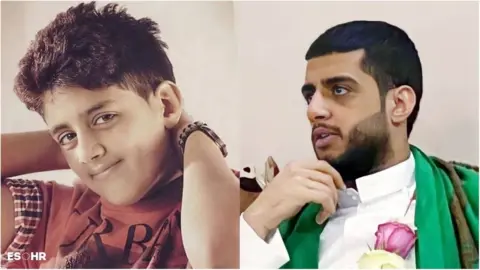Saudis free youngest prisoner who faced execution
 ESOHR
ESOHRHuman rights activists say Saudi Arabia has freed a prisoner who was arrested when aged 13 for suspected involvement in anti-government protests.
Murtaja Qureiris had once been facing the death penalty, although he was finally sentenced to a prison term.
He was held in 2014, partly due to his alleged participation in demonstrations during the Arab Spring in 2011.
Mr Qureiris was believed to be the youngest Saudi prisoner to be detained for involvement in political protest.
Video showed him at a protest rally with other children on bicycles in the Eastern Province of Saudi Arabia, which is home to the kingdom's Shia Muslim minority to which he belongs.
Saudi Shia have long complained of discrimination in the Sunni Muslim-majority country and of being treated as second-class citizens.
Emboldened by uprisings across the Arab world, they took to the streets in protest against the Saudi authorities.
The unrest was quelled by the security forces - and a number of those involved at the time and in subsequent protests were arrested, with dozens later being executed.
Human rights groups say that Murtaja Qureiris was held for several years without being charged.
The before and after pictures of him tell his story - a child when first arrested, he is now a neatly bearded young man.
When he was finally put on trial, he was charged with belonging to an extremist terrorist group. He was accused of accompanying his older brother, who had allegedly thrown petrol bombs at a police station. Prosecutors demanded the death penalty. Activists warned that he might even face crucifixion.
A confession was produced as evidence, although Mr Qureiris maintained that this had been extracted under torture.
The case involving such a young defendant attracted international attention, which may well have played a part in ensuring that he finally received a prison sentence rather than the death penalty.
Originally for 12 years, it was subsequently reduced to eight. With time served, that meant that he was now due for release.
Human rights activists have welcomed the decision to free him, but have lamented the likely physical and psychological toll of his detention - during much of which he was in fear of execution.
In 2020, a royal decree was issued in Saudi Arabia, abolishing the death penalty for offences committed while the accused was a minor. But human rights groups have since expressed concern that this might not be observed in practice.
